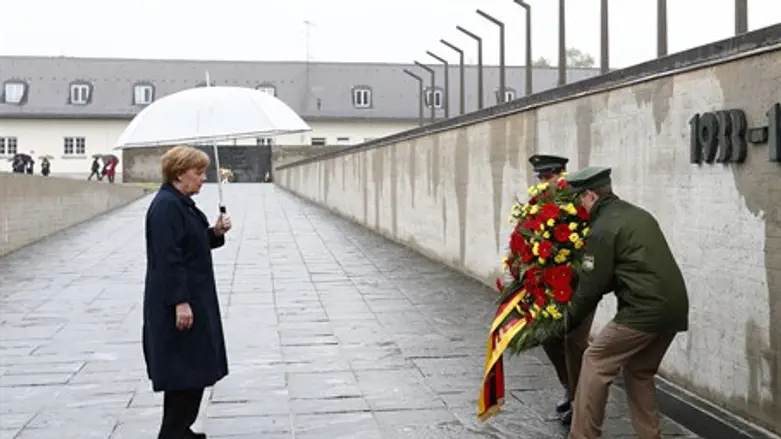
German Chancellor Angela Merkel warned Sunday that society must "never close its eyes" to anti-Semitism as she joined Holocaust survivors to mark 70 years since the liberation of the former Nazi concentration camp at Dachau.
"We are all forever called upon, to never close our eyes and ears to those who today accost, threaten and attack people when they identify themselves somehow as Jews or also when they side with the state of Israel," Merkel told a solemn ceremony.
After laying a wreath with a former French deportee, Merkel thanked ageing survivors of the death camp who had traveled to Dachau, northwest of Munich, for sharing their life stories, saying she was "greatly moved" so many had made the journey, AFP reports.
"We all are forever called upon to make unmistakably clear that Jewish life is part of our identity," Merkel added.
American forces liberated the Dachau camp on April 29, 1945 and discovered on arrival the unspeakable horror that had led to the death of around 43,000 people from starvation or disease.
Similar 70th anniversary commemorations have taken place at other former camps this year, beginning in January with Auschwitz in what was Nazi-occupied Poland, but Dachau is the only one Merkel has attended.
In pouring rain, the silence interrupted only by the tolling of the chapel bells, more than 130 survivors, some in wheelchairs, as well as former US veterans and political figures, also took part.
When American forces liberated the camp "I felt I'd become a human being again", said former French inmate Jean Samuel, in a moving and vivid testimony at the ceremony.
The troops "didn't believe their eyes on seeing the heaps of bodies" on their arrival at the camp, he said, adding: "I was 21 years old, the war had stolen my youth."
'Sign of solidarity'
Merkel joined another French former deportee Clement Quentin to place a wreath of flowers in front of the former camp crematorium.
He told AFP in an interview recently that when the liberation of Dachau came, he was simply "waiting to die".
"We were no longer normal human beings, we weren't yet animals, but only just", the 94-year-old former resistance member, who lives in western France, said.
He also described being subjected to SS medical experiments during his 10 months at Dachau, with the camp's doctors infecting him with tuberculosis.
Josef Schuster, president of the Central Council of Jews in Germany, said Merkel's presence together with survivors was a "sign of solidarity".
He called for the memory of the Holocaust to remain strong, warning that, with time, "distance grows, empathy diminishes" and urged the younger generation to uphold the "responsibility" of never forgetting, even if they were not culprits.
US President Barack Obama paid tribute Wednesday to the more than 200,000 Jews, gays, Roma, political opponents, the disabled and prisoners of war who were imprisoned at Dachau from 1933.
The Nazis opened Dachau as a concentration camp for political prisoners in March 1933, just weeks after Adolf Hitler took power.
It was the first such site in Germany and served as a model for all the camps to follow.
On the eve of the ceremony, Merkel stressed in her weekly podcast message Germany's "particular responsibility", 70 years after the end of World War II and warned there was no question of drawing a line under history.
"We Germans have a particular responsibility here to handle what we perpetrated in the period of National Socialism attentively, sensitively and also knowledgeably," she said.
In 2013 Merkel became the first German chancellor to go to the former Dachau concentration camp but faced criticism for including the visit on an election campaign swing ahead of a beer-tent rally for supporters.
Last year she was awarded the General Andre Delpech Prize by an association of former prisoners at the Dachau camp, named after a former inmate.
The iron gate to the former death camp which bears the chilling inscription "Arbeit Macht Frei" (Work Will Set You Free) has had to be replaced after the original was stolen by thieves from the camp's memorial last year.